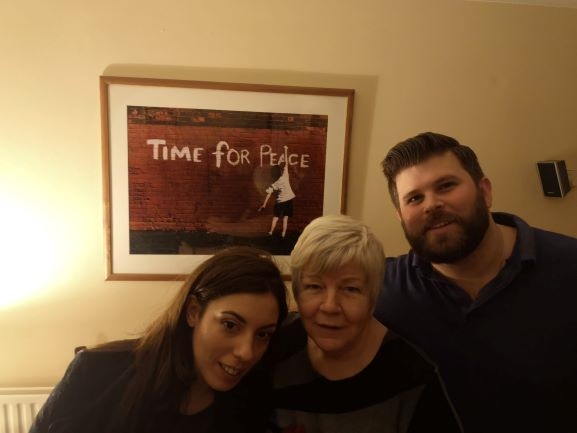Community Voices is an interview series where Michael Avila and Ani Kanakaki speak to a range of folks from the voluntary and community sector in Northern Ireland about the work they’re doing to bring about positive change. The series, formally known as #AtsUsNai, is produced in partnership with AvilaMedia and funded by the Community Relations Council. This week Michael and Ani caught up with Mary Montague, co-founder of the mediation and peacebuilding organisation Tides.
One might ask, what exactly is mediation? Here’s one take:
Mediation is a flexible process that can be used to settle disputes in a whole range of situations. Mediation involves an independent third party, the mediator, who helps people to agree a solution when there is a disagreement. The mediator helps parties work out what their issues and options are, then use those options to work out an agreement.
What’s unique about mediation and its process is that it empowers the parties involved in a dispute to resolve their own issues collaboratively. Mediators do not ‘tell’ those being mediated how to resolve their issues, they simply help guide conversations, providing suggestions and only intervening when talks break down. Mediation has arguably been Northern Ireland’s greatest tool and, in fact, the technique is what brought about the Good Friday/Belfast Agreement.
Mary Montague has been on the frontlines of peace building for 40 years, mediating conflicts starting in her own community, then moving outwardly and now advocates for peace in countries all around the world.
“To me, mediation is any activity that restores right relationships,” she tells us.
Mary says that for mediation to be successful, dialogue has to be authentic and that you must maintain honesty and integrity as a mediator. ‘Non-truths’ also have to be addressed for dialogue to continue and there are no quick-fixes in seeking resolutions between parties.
Mary co-founded Tides, one of Northern Ireland’s leading mediation organisations which has partnered with statutory bodies across Northern Ireland, and has been transforming conflicts in the grassroots throughout the peace process.
She is also a former mediator with the ecumenical Corrymeela Community and a founding member of the Women Waging Peace Network. Additionally, Mary is a member of Mediation Beyond Borders (MBB) and was awarded as ‘Peacemaker of the Year’ by the organisation in 2015 in Bucharest. She has worked promoting peace in regions as far away as the Balkans, Afghanistan and Sudan. She still works as a liaison between local communities and diplomats visiting Belfast to better understand what has been successful here and may work in their home countries to foster conflict transformation.
Mary believes these types of ‘quiet conversations’ – with ordinary people living in Belfast’s interface areas – go a long way to bringing real and lasting change in Northern Ireland (Belfast Telegraph, 2015). Mary also believes there is a lot the international community can learn about what Northern Ireland has done to move forward and vice versa.
“When speaking to people abroad, I assure them that ‘we haven’t necessarily done everything right, but this is what we have learned,’” she says. This approach is a calling card for a successful peace builder, modelling the ‘mediative’ technique of ‘showing’ rather than ‘telling’ and providing an atmosphere that allows more creative perspectives to be considered and solutions implemented

Despite coming from a family and community that suffered severely as a result of violence throughout the conflict and facing threats due to her work, Mary remains steadfast and hopeful about whatever a ‘future Ireland’ may look like – whether the status quo remains or unification becomes more plausible.
Mary is proud of her Irish Catholic heritage, but is also equally proud of sharing society and building long-lasting friendships with her Protestant neighbours. She explained that it is now 2020 and the constitutional issue isn’t going away any time soon. That being so, this allows us to be creative about the future. She explained that we don’t have to view the future as ‘orange and green’ or in the traditional confines of Ireland or the UK, but we can work together creatively to seek the best future for our children.
This starts with including those disengaged in her own community – the so-called, dissident Republicans. For Mary, this also means including anyone from disenfranchised and marginalised communities of any background in the formation of a future that is brighter for all and that the transformation has to start – and include – the grassroots.
“We also need to make sure to instil confidence in the unionist community that they have an equal place in whatever the future holds for the island,” she says, adding: “I don’t want a future without ‘my’ unionist community – I don’t want that. I want us to be together and do the best for our families and our communities. We need to do it together.”
Beaming with the relentless positivity of someone who has been successful garnering peace over four decades, Mary explained to us that we have a whole new generation of talented peace builders willing and able to keep moving Northern Ireland forward in any capacity. As long as that capacity remains ‘shared’, there’s no telling what we could achieve together.
So the next time someone asks you what a ‘mediator’ is, answer: “Mary Montague!”

AvilaMedia is a social enterprise running community and research projects across Northern Ireland. If you’re interested in being interviewed for the #AtsUsNai project, you can get in contact with AvilaMedia here.
Catch up on other interviews from the Community Voices series:
Anne Carr, founding member of the Women’s Coalition: “This is a time for doing, not talking”
